
Newcastle: swing bridge
The significance of Newcastle and the Tyne as a cradle of Britain's Victorian industrial development is easy to appreciate when you see all of the bridges over the Tyne. |

Newcastle: four of the Tyne bridges
|
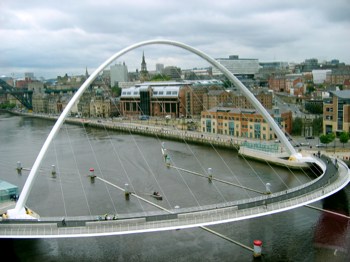
Newcastle: Millennium bridge
Slightly further down river on the Newcastle quayside are the new millennium grant-funded structures: the 'blinking eye' pedestrian bridge which leads to the Baltic Art Gallery made from a flour mill structure and the Sage Music Centre - still under construction at the time when we there. |

Newcastle: Millennium bridge
|

Newcastle: Baltic Gallery
|
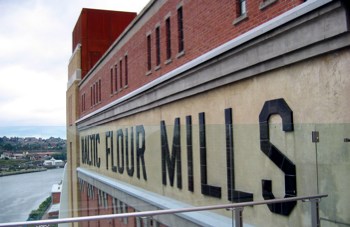
Newcastle: Baltic Gallery viewing terrace
|

Newcastle: New music centre and high-level bridge
|
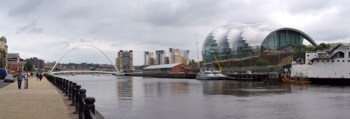
Newcastle: Millennium bridge and the music centre
|
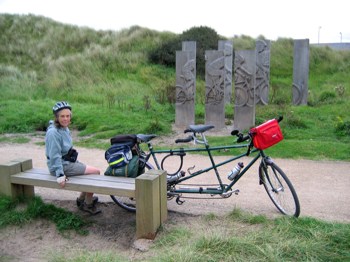
On the Sustrans track near Blyth
After Newcastle the route passes through a park beside the Tyne and fairly grim industrial scenery before it reaches the coast at Tynemouth, so we didn't take any more photos on the first day. This was near the start of our second day's journey. Sustrans used some of their millennium grant to put pieces of public art along their cycle tracks. |
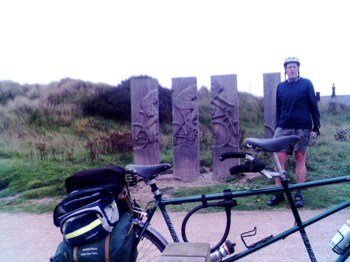
Jean's version of the same shot
|

Lynemouth smelting plant
|

Lynemouth
These two photos of the view at the Lynemouth smelting plant illustrate the intrusion of heavy industry into otherwise beautiful coastal terrain for about 30 miles north from the Tyne, probably due to the presence of large coal mine under the sea along this section of coast. |
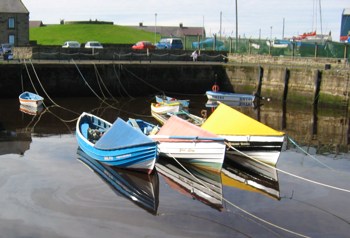
Amble harbour
After Lynemouth there are no more coal mines and the scenery improves dramatically, as does the nature of the towns and villages, of which Amble is a typical example. |
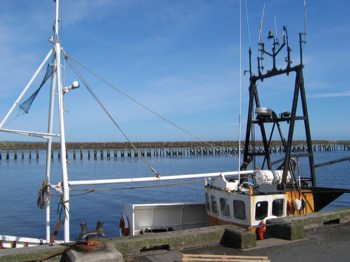
Amble harbour
|

Walkworth castle
castles and stately homes abound. Hence Sustran's title for the route: Coast and Castles. |
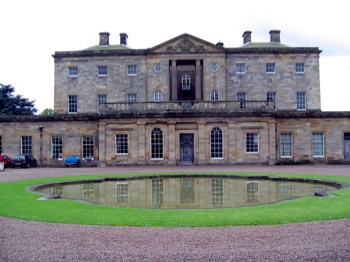
Howick house
|
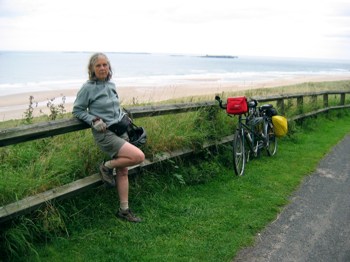
The beach near Seahouses
Nearly all of the beaches are sandy on this coast and many of them are magnificent - long unpopulated stretches of sand bordered by fields and pastures. The Farne islands are in the background of this one. |
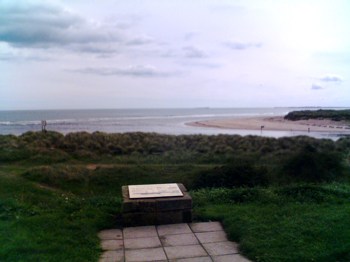
Alnmouth
Alnmouth is a charming (and popular) village at the mouth of the river Aln. We picnicked at this spot which is actually at the end of the high street. |

Bamburgh castle
Bamburgh is a village clustered around an immense and magnificent-looking castle. one of the many built to defend the English against the Scots in the years before their union in 1604. |
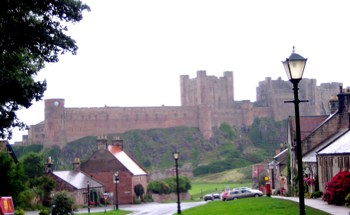
The village of Bamburgh with the castle looming over it
|
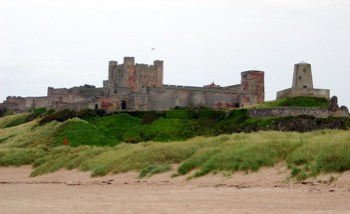
Bamburgh castle
The beach offers a magnificent view of the castle. |

Bamburgh castle
|

Bamburgh castle seen from Lindisfarne (Holy Island)
Holy Island (traditionally named Lindisfarne) is on a low-lying spit of land to the north of Bamburgh that is partially covered at high tides. We chose to maroon ourselves there for a day to see its sights. |
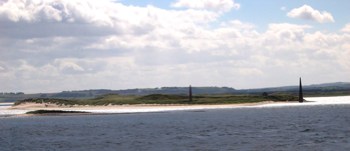
Looking towards the mainland from Holy Island
|
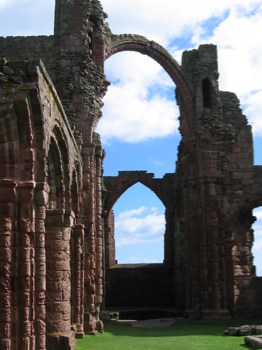
Lindisfarne Priory
The two main sights are the ancient priory which is billed as one of the cradles of christianity in Britain, and the castle. |
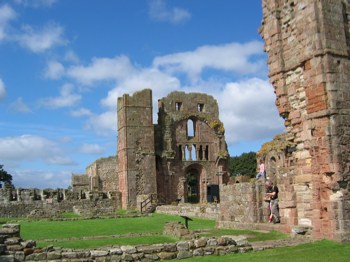
Lindisfarne Priory
|
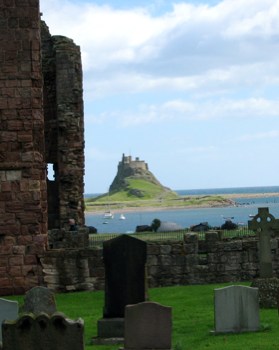
Lindisfarne castle seen from the priory
|
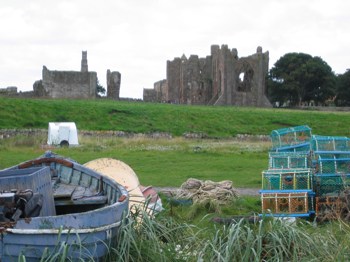
From the harbour at Lindisfarne
|

Lindisfarne harbour from the castle
The castle was lovingly restored as a holiday home around 1910 by the architect Lutyens and his client Edward Hudson, founder of Country Life magazine. The result is an ideal holiday retreat on a grand scale, now run by the National Trust. |

The causeway just as it is becoming passable
Our departure from Lindisfarne was quite dramatic. The wind was blowing hard in our faces, throwing the spray at us as we traversed the causeway. We had to wait for the tide to recede to avoid soaking our feet as we pedalled. |
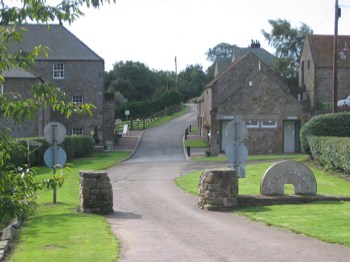
Heatherslaw Mill
Our friends Gemma and Dave provided us with a wonderfully hospitable evening and night at their cottage in Crookham village for the last night of our trip. Sadly we took no photos of Crookham, but this sequence taken in a nearby village may give some idea of the sort of countryside they are based in - it's a magnificent valley at the foot of the Cheviots, 15 mile from Berwick on Tweed. |
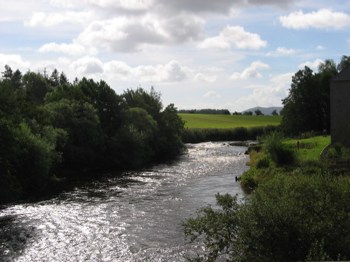
River at Heatherslaw
|
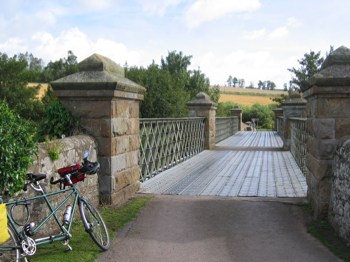
Bridge at Heatherslaw
|

From the bridge
|
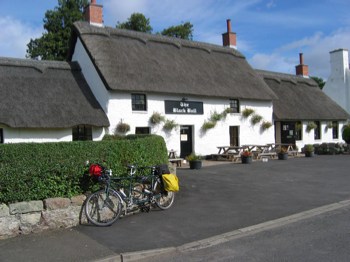
Thatched pub at Etal
|
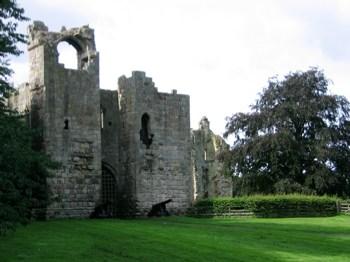
Etal Castle
|
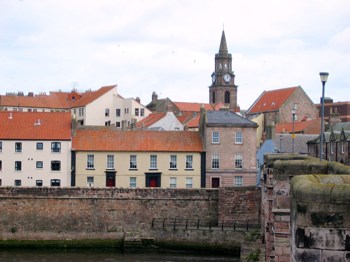
Berwick-on-Tweed from the old bridge
We cycled directly from Crookham to Berwick, leaving a couple of hours for us to see Berwick before our train back to London was due. |

View south from Berwick town walls
The circular walk of the Elizabethan town walls (still totally intact) provides an excellent way to see both the town and it's surroundings. |
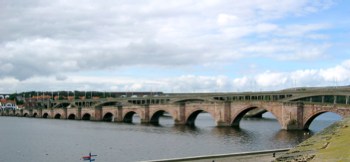
Berwick old bridge
As in Newcastle, the bridges are an important and elegant addition to the landscape. |

Stevenson's rail bridge over the Tweed at Berwick
|

Another view of Stevenson's bridge
|
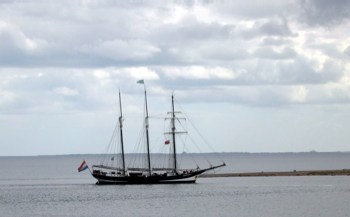
A tall ship enters Berwick harbour
|